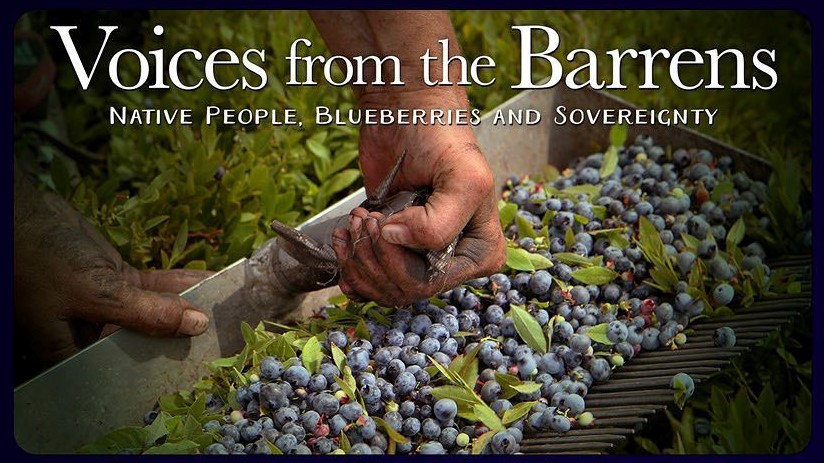
UMaine Machias to screen ‘Voices from the Barrens’ Sept. 30 as premiere of Right to Food film series
The documentary “Voices from the Barrens: Native People, Blueberries and Sovereignty” will screen at the University of Maine at Machias Performing Arts Center on Friday, Sept. 30 at 7 p.m. to kick off a Maine-focused film series called The Right to Food.
The screening will be followed by a Q&A with a panel, including representatives from Passamaquoddy Wild Blueberry Company, indigenous blueberry raking families, and Passamaquoddy individuals with expertise in indigenous food systems and culture.
The second film “Hungry Now,” will premiere Nov. 13 at 3 p.m. at the Collins Center for the Arts at the University of Maine.
“Voices from the Barrens” documents the wild blueberry harvest of the Wabanaki People from the United States and Canada. Each August, First People of the Canadian Wabanaki, the Mi’kmaq and Maliseet tribes cross the U.S.-Canada border into Maine to take part in the tradition of hand raking blueberries with their Passamaquoddy brothers and sisters. The film focuses on the Passamaquoddy Tribe’s challenge to balance blueberry hand raking traditions with the economic realities of the world market, which favor mechanical harvesting.
Nancy Ghertner, the film’s director, was introduced to the Passamaquoddy at Sipayik while she was a student at Colby College, where she was involved in a research project related to the tribal communities of Maine. “Voices from the Barrens” was inspired by Ghertner’s research into agriculture labor across the international border.
The film was recorded between 2014 and 2019 on the barrens of Washington County, in the communities of Motahkomikuk (Indian Township); Sipayik (Pleasant Point); and the First Nations of Elsipogtog, New Brunswick and Eskasoni, Nova Scotia.
The documentary premiered in 2020 on Indigenous Peoples’ Day at the Camden International Film Festival. It was featured in nine film festivals around the world, receiving Best Documentary award at the Montreal International Wreath Awards Festival and award nominations at the American Indian Film Festival.
In Maine, the documentary has been broadcast on Maine Public Television and has reached audiences at colleges, universities, public libraries, conservation organizations and land trusts, as well as the Maine Organic Farmers and Gardeners Association (MOFGA). The documentary has also been included in the curriculum of Maine Indian Education and schools in the First Nations in New Brunswick.
“Maine Indian Education’s schools are so pleased to share ”Voices from the Barrens” with our students,” says Beth Clifford, curriculum coordinator at Maine Indian Education. “This documentary provides many entry points for students as it honors their experiences, those of their families and their communities.”
The second film in The Right to Food series is director and UMaine Machias lecturer Alan Kryszak’s 2022 documentary “Hungry Now.” Filmed in coastal and Down East Maine over two years, “Hungry Now” explores the twisted path from a child in food insecurity to a homeless adult, along with the “helpers” who intercede at all stages of a human life. This documentary will premiere Nov. 13 at 3 p.m. at the Collins Center for the Arts; Dec. 2 at 7 p.m. at UMaine Machias; and on PBS/Maine Public Television soon after.
Contact: Jennifer Isherwood, jishio@maine.edu
